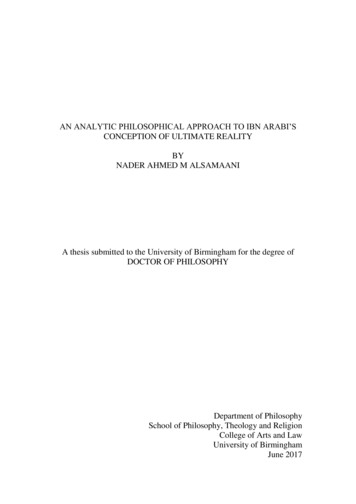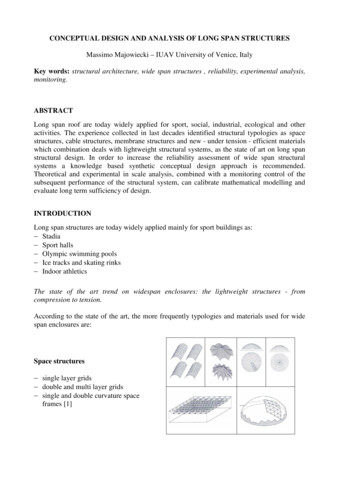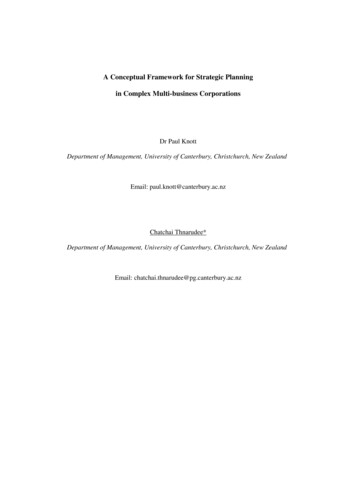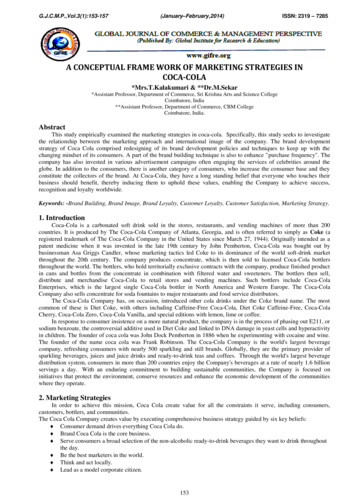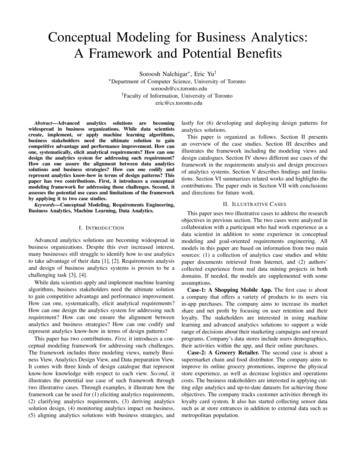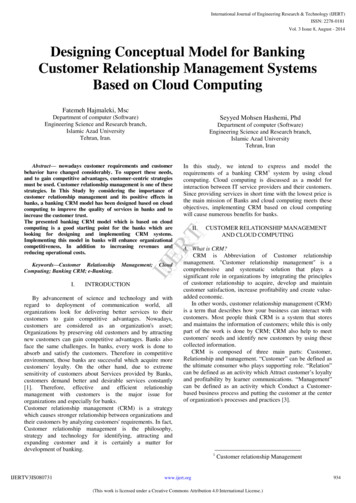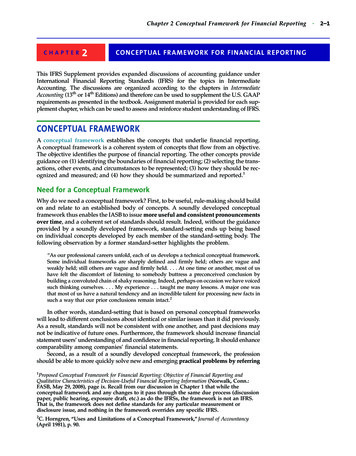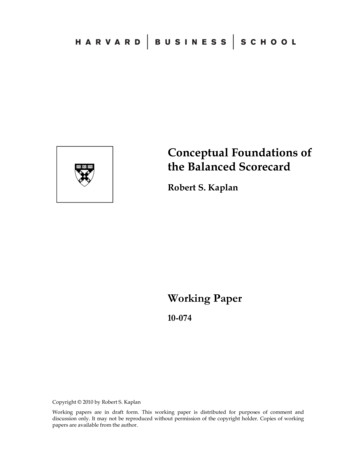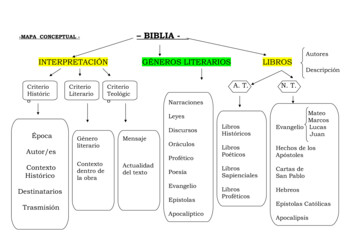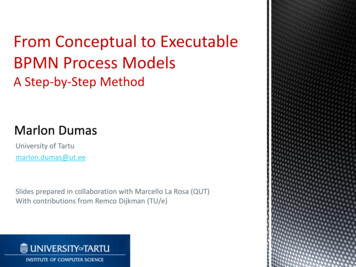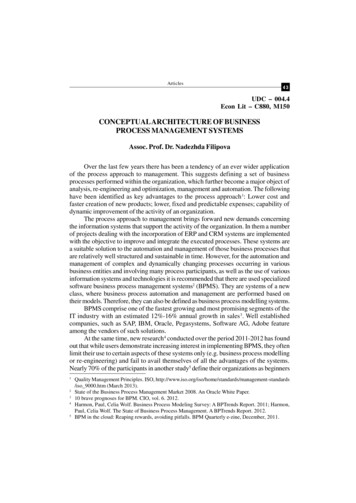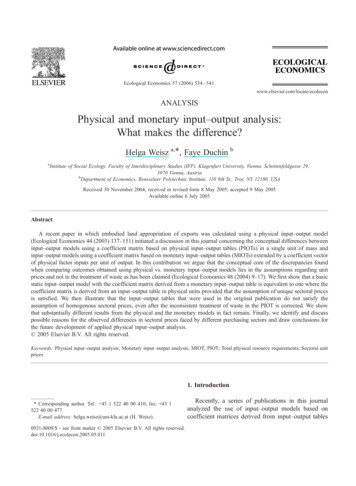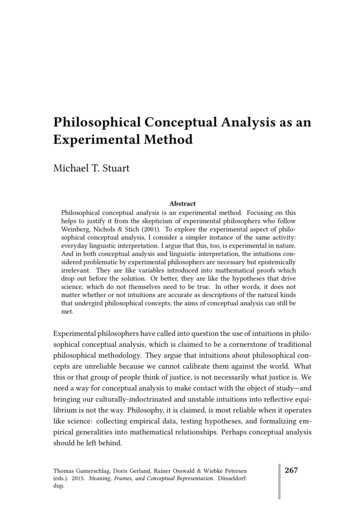
Transcription
Philosophical Conceptual Analysis as anExperimental MethodMichael T. StuartAbstractPhilosophical conceptual analysis is an experimental method. Focusing on thishelps to justify it from the skepticism of experimental philosophers who followWeinberg, Nichols & Stich (2001). To explore the experimental aspect of philosophical conceptual analysis, I consider a simpler instance of the same activity:everyday linguistic interpretation. I argue that this, too, is experimental in nature.And in both conceptual analysis and linguistic interpretation, the intuitions considered problematic by experimental philosophers are necessary but epistemicallyirrelevant. They are like variables introduced into mathematical proofs whichdrop out before the solution. Or better, they are like the hypotheses that drivescience, which do not themselves need to be true. In other words, it does notmatter whether or not intuitions are accurate as descriptions of the natural kindsthat undergird philosophical concepts; the aims of conceptual analysis can still bemet.Experimental philosophers have called into question the use of intuitions in philosophical conceptual analysis, which is claimed to be a cornerstone of traditionalphilosophical methodology. They argue that intuitions about philosophical concepts are unreliable because we cannot calibrate them against the world. Whatthis or that group of people think of justice, is not necessarily what justice is. Weneed a way for conceptual analysis to make contact with the object of study—andbringing our culturally-indoctrinated and unstable intuitions into reflective equilibrium is not the way. Philosophy, it is claimed, is most reliable when it operateslike science: collecting empirical data, testing hypotheses, and formalizing empirical generalities into mathematical relationships. Perhaps conceptual analysisshould be left behind.Thomas Gamerschlag, Doris Gerland, Rainer Osswald & Wiebke Petersen(eds.). 2015. Meaning, Frames, and Conceptual Representation. Düsseldorf:dup.267
Michael T. StuartOne reason this conclusion is mistaken is that conceptual analysis is alreadyquite scientific. Science is a refinement of our normal thinking patterns with itsroots going all the way back to child’s play (see for example, Cook, Goodman& Schulz 2011). Why think that conceptual analysis, a refined version of otherlinguistic practices, is divorced from those same proud origins? Imre Lakatosargued that all of mathematics is nothing more than a series of conceptual reformations, which produces better and better definitions of mathematical conceptsby a never-ending onslaught of counterexamples (1976). For Lakatos, this processis at once a mental, linguistic, and community activity and it achieves some epistemic good. Mathematics is thought to yield certainty, and plays an indispensablerole in physical science. Perhaps philosophical conceptual analysis can be legitimated in a similar way, if philosophy plays an indispensable role in science aswell. Yet this is not the argument I want to make. Rather, I argue that conceptualanalysis in philosophy is a dynamic process which can be defended epistemologically because of important features it shares not with mathematics, but with thescientific method.Conceptual analysis can be defined functionally. One of its goals is to specifythe extension of a concept. For example, what does justice refer to? Part of thisis finding properties common to all or most instances of a concept, or outliningrelationships between the extensions or intensions of concepts. For example, areall the instances of water instances of H2 O ? Are electrons only to be found inthe context of an atom? Another goal that is somewhat independent of the lastfew is specifying the “normative profile” (or normative characteristics) of a concept. This goal asks what should be the extension of a concept, or its relationto other concepts. A successful conceptual analysis of knowledge should therefore reveal which things count as known, what it is about them that makes themknown (for example, as opposed to only believed), how known things relate totrue things, and so on. But also, such an analysis must tell us what should countas known, what should be the relation between the known and the true, and soon. The difference between conceptual analysis in philosophy on the one hand,and science on the other, is that the normative profiles of scientific concepts (forexample, quark) can be quite thin. Determining their extensions and conceptualrelations are often more important than sketching their normative profiles. Asking what quark should refer to is a sensible question, but in practice it is lesscentral to scientific research than finding the properties common to quarks and268
Philosophical Conceptual Analysis as an Experimental Methodthe relations between quarks and other physical-theoretical entities. A differentemphasis is often found in philosophical conceptual analysis, wherein normativeconsiderations predominate. However, the difference is only one of degree.One important motivation of Meaning, Frames, and Conceptual Representation isto push interdisciplinary boundaries, and considering conceptual analysis as anexperimental method takes this motivation seriously because it brings togetherevidence from the study of language, cognitive science and philosophy of science.I argue that in both conceptual analysis and scientific inquiry we form hypotheses and then “test” them. The literature on scientific experiment is massive (forexample, Ackermann 1985, Batens & Van Bendegem 1988, Bogen & Woodward1988, Cartwright 1983, Collins & Pinch 1993, Franklin 1986, 1990, 2002, Galison1987, 1997, Gooding 1990, Gooding et al. 1989, Hacking 1983, Latour & Woolgar1986, Pickering 1985, Pinch 1986). Yet aside from a few German Idealists, veryfew have written about experimenting with concepts as linguistic entities (seeFehige & Stuart 2014). After presenting the problem from experimental philosophy in more detail, I look at conceptual experimentation from two sides. First, Iexamine some relevant literature from cognitive science as an attempt to describethe mechanisms at work in conceptual experimentation. Second, I propose a preliminary account that attempts to defend the epistemological status of conceptualanalysis conceived as a type of experimental linguistic interpretation.1 Experimental philosophy and skepticism aboutconceptual analysisWeinberg, Nichols, and Stich helped found a sub-discipline in philosophy withtheir 2001 paper, “Normativity and Epistemic Intuitions.” In it, they identified atype of philosophical strategy they called “Epistemic Romanticism.” Accounts thatemploy this strategy, like Plato’s, rely on the premise that conceptual knowledge,for example, knowledge of the Forms, is already implanted in us, and we mayextract it in dialogue. Weinberg, Nichols and Stich call the family of theoriesthat work this way “Intuition Driven Romanticism,” since they consider sharedintuitions as evidence for a kind of innate, a priori knowledge.For these authors and many of those who followed them (for example, Alexander et al. 2010, Knobe & Nichols 2008, Machery et al. 2004, Mallon et al. 2009,Swain et al. 2008, Weinberg et al. 2006), an intuition is simply a spontaneous269
Michael T. Stuartjudgment about the properties of some case for which the agent may not be ableto offer any plausible justification. Intuition Driven Romanticism takes intuitionsas data, and then produces normative epistemic claims that are dependent on theintuitions used, at least in part. That is, if the input were different, the outputwould also be different (in proportion to the change in the input). Two examplesthey give of Intuition Driven Romanticism are reflective equilibrium (see Goodman 1955) and Alvin Goldman’s “justificatory rules” (see Goldman 1986:60).Thus, some group of cognitive agents might have intuitions and belief-formation processes that are different from those of western philosophers, and whenthey run their intuitions through their chosen method (for example, reflectiveequilibrium) they will emerge with different epistemic norms. The question is:how can we decide which set of norms to follow? There is no answer that isnot also subject to objections about relativity, so the whole process is misguided.Epistemic norms will be relative to different cultures, socio-economic classes,and even the number of philosophy courses taken. And it is argued that suchintuition-relativity does in fact exist. Here is a famous example of the type ofevidence presented.A scenario called “the Trutemp Case” is presented to survey volunteers. Thecase consists of the following report: A child on a deserted island gets hit onthe head by a coconut, and as a result knows the exact temperature all the time,but does not know that he has this power. The survey volunteers are asked:when the child says, “It is 30 degrees Celsius,” does he know this, or does he onlybelieve it? Apparently, East Asian people are more likely than Westerners tosay that a person so affected only believes their temperature guess. However, ifyou say instead that a team of scientists secretly tinkered with the boy’s brainto cause this ability, the situation reverses and East Asian people become morelikely than Westerners to report that the boy knows what he says. And finally, ifyou also say that many other people in the boy’s community were secretly giventhe ability to tell the temperature, and then ask the knowledge question about asingle member’s belief about the temperature, East Asians are even more likely toattribute knowledge. The Westerners keep their judgments essentially constantover all these changes. The conclusion drawn is that the relation between aperson and their community affects the epistemological status of their beliefs,but only if you are East Asian.270
Philosophical Conceptual Analysis as an Experimental MethodIn another well-known example, a Gettier case is presented to different culturalgroups with each group providing consistently different responses. A standardcase is about my friend who thinks George has an American car. In fact, justyesterday George traded in his Buick for a Pontiac (which is still American),so my friend says something true, and justified, when she says “George has anAmerican car.” Now, when asked if my friend knows the above statement, moreEast Asians than Westerners respond in the affirmative.Weinberg, Nichols and Stich conclude that intuition-based analyses only provide information about the people who participate in them, and not any mindindependent truths about the referents of philosophical concepts. Unfortunately,mind-independent truths are precisely what “epistemically romantic” philosophers seek.If the above analysis of intuition-relativity is correct, I want to argue that thisstill would not affect the possibility of successful conceptual analysis, since theepistemic status of those intuitions is irrelevant to the outcome of conceptualanalysis. They are epistemically irrelevant in exactly the same way that hypotheses in science are epistemically irrelevant to the status of the output ofthe experimental method: namely, good science can be done with false hypotheses. If successful, this argument would not make that output infallible: there arewell known issues concerning the epistemic status of the scientific experimentalmethod. Someone might object that it is not meaningful to talk about “the” experimental method as though it were one thing. Yet I will assume that there areinteresting commonalities shared by different instances of experimental methodsin science which we may focus on in a general way; that there is something wecan call the experimental method of science, and it is among the best epistemicmethods we have at our disposal, will be a shared assumption given the experimental nature of “experimental” philosophy.Now that we know the criticism, let us look more closely at the role of intuitionin conceptual analysis.2 Conceptual analysis and linguistic interpretationConceptual analysis can be understood as an instance of linguistic interpretation(Cohnitz & Häggqvist 2009:9). When philosophers try to discover the contentof say, knowledge or justice, they often begin by outlining how the concept is271
Michael T. Stuartused (in philosophy, or in some other context of discourse) in order to discoverthe purpose it serves. Using this knowledge, we attempt to extrapolate or createmeaning. We do the same thing when we consider the meaning of a linguistic entity. Conceiving of conceptual analysis as an act of interpretation helps toclarify the connection to experimentalism and avoid the problems of intuitionskepticism, since the intuitions involved in linguistic interpretation need not beepistemically justified to serve their purpose. In cases of linguistic interpretation,we need to start somewhere to figure out the meaning of an utterance. If we beginwith intuitions based on previous experience with a speaker, or a perceived typeof speaker, or other contextual features, this will usually speed things up. Butwe need not begin with accurate information or accurate intuitions. Given thescript of a conversation not meant specifically to deceive us, we can discover agreat deal about the meaning of unfamiliar terms. This sort of activity is whatQuine and Davidson discussed using models of Radical Translation and RadicalInterpretation. The intuitions we begin with need not be true or accurate or innate or epistemically privileged because interpretation is a special kind of iteratedprocess, one that can begin with false premises and proceed to true conclusionsby repeated application of the same method. Perhaps beginning the process ofinterpretation with very bad intuitions will drag it out, because we have to throwout the unhelpful intuitions and begin again with others until we find the truth,but it will always be possible to complete, at least in pri
Experimental Method Michael T. Stuart Abstract Philosophical conceptual analysis is an experimental method. Focusing on this helps to justify it from the skepticism of experimental philosophers who follow Weinberg, Nichols & Stich (2001). To explore the experimental aspect of philo- sophical conceptual analysis, I consider a simpler instance of the same activity: everyday linguistic .
